New Rental Insurance Scheme for Landlords
Tuesday 02 March 2010
A new insurance scheme for landlords that offers protection against the non-payment of rent has been introduced in France.
As we know from the enquiries we get from you, renting out property in France is a popular choice for many existing expats as well as those looking to relocate.
Most of you choose to do so by renting out holiday gites, or through the provision of bed and breakfast accommodation.
In this way, not only are the risks of non-payment of the rent negligible, but recovery of possession of the property at the end of the letting is assured.
However, renting out of short term holiday accommodation may not always be the most lucrative option, particularly if you do not have a desirable property to offer in a popular holiday area.
Even if it is located on the tourist track, the sheer number of holiday lets available in France means that the competition is often very stiff.
An alternative route taken by some is to rent on an annual basis to either French nationals, or those from overseas who have chosen to rent rather than buy before a final decision is made to buy.
In order to make more homes available for rent, the French government have recently introduced a universal form of guarantee against the non-payment of rent.
The scheme is called Garantie de Risques Locatifs (GRL).
Private insurance schemes have existed in the past, but as they have generally only been available to those who did not need them, they have not been widely used.
The GRL is still operated through the banks and insurance companies, although in order to increase access to these policies, the government has undertaken to act as the insurer of last resort.
Only a couple of insurers have yet launched the product, but others will almost certainly follow. That said, the insurers can still offer their own product, but if they do so, they cannot also offer the GRL.
Under the new government backed GRL scheme, all tenants are eligible, provided the rental does not exceed 50% of their income, and the monthly rent is below €2000.
The property can either be furnished or unfurnished, but it must be the main home of the tenant.
The premium to the landlord is around 2% of the rental, although insurers are free to set their own rates.
In return, there is a guarantee of the rent, up to a generous €70,000, which also includes legal costs associated with recovery of possession of the property.
There is also a guarantee against the cost of repairing damage caused by a tenant, up to €7,700 (€3,500 for a furnished letting).
If a tenant is unwilling to vacate, it can take years to recover possession through the courts, and even then the local préfet has the final word on whether to execute the order of the court.
So in some cases landlords can find themselves unable to evict a tenant, particularly if the household is considered to be ‘vulnerable’.
The new rental guarantee does little to remove this problem, although it does institute a system of social welfare support for those who do fall into arrears, with the implied threat to tenants that they need to make use of it to sort their difficulties, or receive less sympathetic consideration by the local préfet.
Despite the undoubted advance of the new system, it has been received with a muted response from the main landlords association (UNPI) and consumer groups.
The former have taken the view that, as much as it helps with giving some reassurance to a landlord, in practice ‘in those areas where rental accommodation is in high demand, a landlord will be able to select their tenant, privileging those for whom they do not need to take out an insurance policy. ‘
On a different note Que Choisir, the consumer body somewhat uncharitably considers that the insurance policy favours property developers seeking to sell off their homes for rent to investors at a higher price, in the full knowledge that higher rents will be covered by the insurance policy. The builders association is one of the members of the body overseeing this scheme.
More generally, there is concern amongst landlords and other commentators that a ratio of income to rent of 50% is irresponsibly high, and will lead a higher number of tenants being unable to meet their rental obligations.
Thank you for showing an interest in our News section.
Our News section is no longer being published although our catalogue of articles remains in place.
If you found our News useful, please have a look at France Insider, our subscription based News service with in-depth analysis, or our authoritative Guides to France.
If you require advice and assistance with the purchase of French property and moving to France, then take a look at the France Insider Property Clinic.





